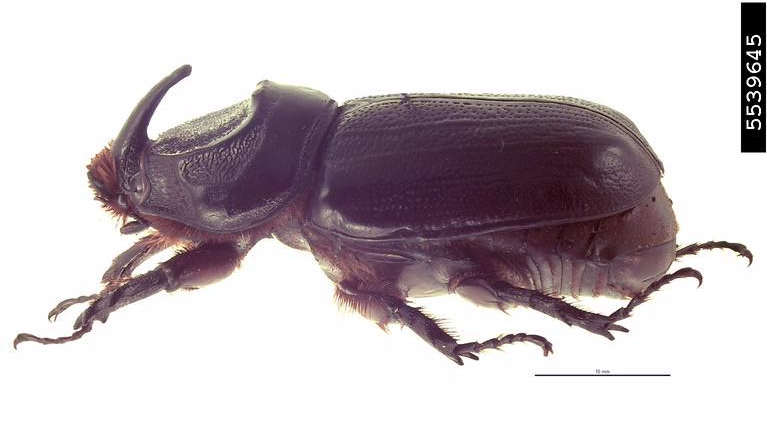Control of scale insects in fruit trees
Scale insects are a diverse group of small, sap-sucking insects with flat or domed shells. Their lack of mobility and protective shell make them difficult to manage. This explains why many scale species are commercial agricultural pests. Scales pierce plant tissue with their mouthparts to feed on the sap weakening the plant. Any excess fluid…
Agricultural pest control by bats in Madagascar
A new study has brought to light how native bat species in Madagascar are playing an important role in the control of agricultural crop pests. If more attention and information was brought to this, zoologists from the University of Cambridge believe that bats could reduce the financial strain on farmers for chemical pesticide use as…
Coconut Rhinoceros Beetle on Guam – an update
An adult male coconut rhinoceros beetle. Emmy Engasser, Hawaiian Scarab ID, USDA APHIS ITP, Bugwood.org 10 years ago the Coconut Rhinoceros beetle (CRB) was first discovered on the western Pacific island of Guam. Since then, these shoe-shine black, miniature invaders have spread to all parts of the island and are laying waste to the local coconut…
Kenya gets new production facility to control crop pest
By Sam Otieno. Reblogged from SciDevNet A facility has been launched in Kenya to aid commercial production of a protein bait to control fruit flies in Sub-Saharan Africa. The US$250,000 facility, which resulted from public-private partnership involving the International Centre of Insect Physiology and Ecology (icipe) and Kenya Biologics Ltd, will enable smallholders control fruit flies that devastate their fruits…
The Bird, the Borer and the Bean
A recent study carried out in Costa Rica found that insectivorous birds such as the Yellow Warbler help to reduce infestations of the Coffee Berry Borer Beetle on coffee plantations by 50%. This free pest control service is estimated to save a medium sized coffee farm up to $9,400 per year. The study carried out by…
Could Spider Venom Be Used As A Novel Insecticide For Major Crop Pests?
A new protein discovered in the venom of Australian tarantulas can also kill insect pests that consume the venom orally. The protein known as orally active insecticidal peptide-1 (OAIP-1) was found to be highly toxic to insects that consumed it, with a similar efficacy to the neonicotinoid insecticide imidacloprid. In particular, the protein was found…
New strategy required for delaying insect resistance to Bt crops
Transgenic Bt crops have been grown around the world since the 1990s and have contributed to increased yields by controlling agricultural pests. Due to the importance of this technology, there has been continuous study into the development of resistance to Bt crops and how best to avoid this happening. A recent investigation into the rapid…
In Uganda, plant doctors gain new insights
Nineteen plant doctors from the eastern and central region of Uganda are equipped and ready to give good advice to farmers – by Jane Frances Asaba and Joseph Mulema in Kampala, Uganda and Phil Taylor in UK As Plantwise Uganda continues to roll out more plant clinics, the need for training of plant doctors to…
Plantwise Plant Clinics in Trinidad and Tobago
Trinidad and Tobago Country Coordinator Shamela Rambadan sent the photo below of a Soursop (Annona muricata) plant brought into a clinic in County Victoria in Trinidad and Tobago by farmer Ramesh Ramnanan last month. The symptoms described included yellowed, distorted leaves and visible insects on the leaves, as seen in the photo. Plant health officer…





